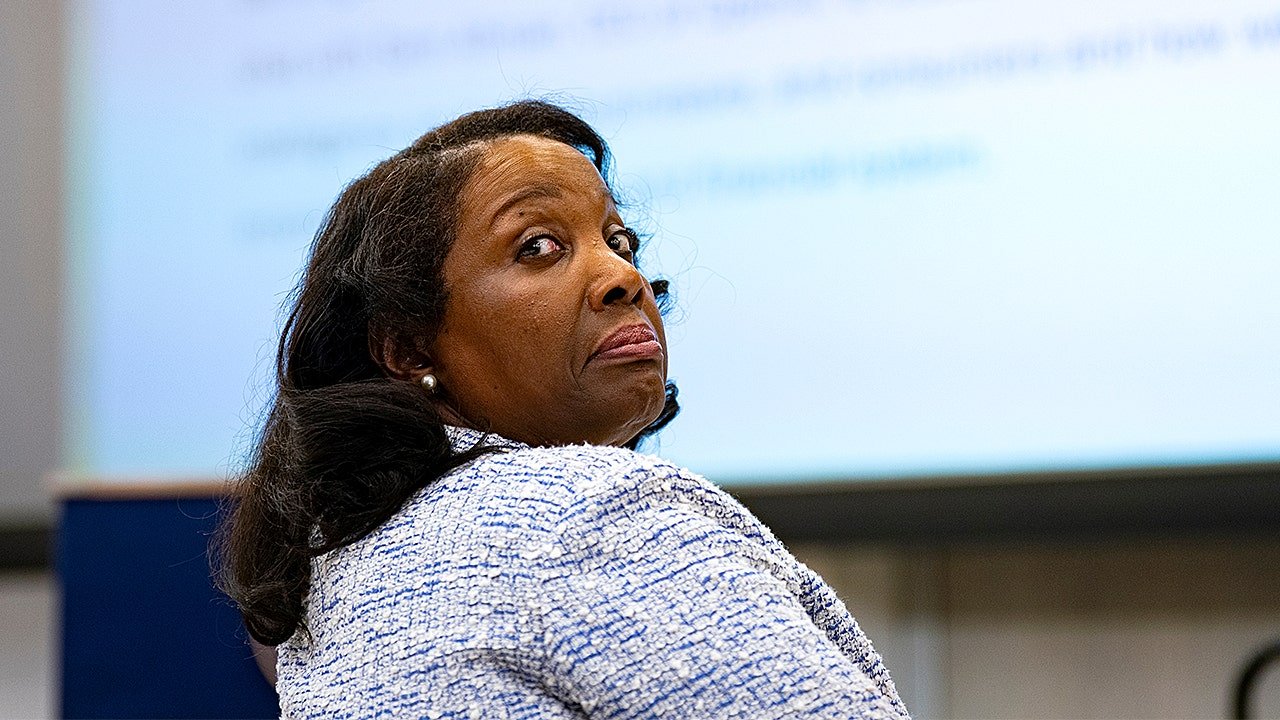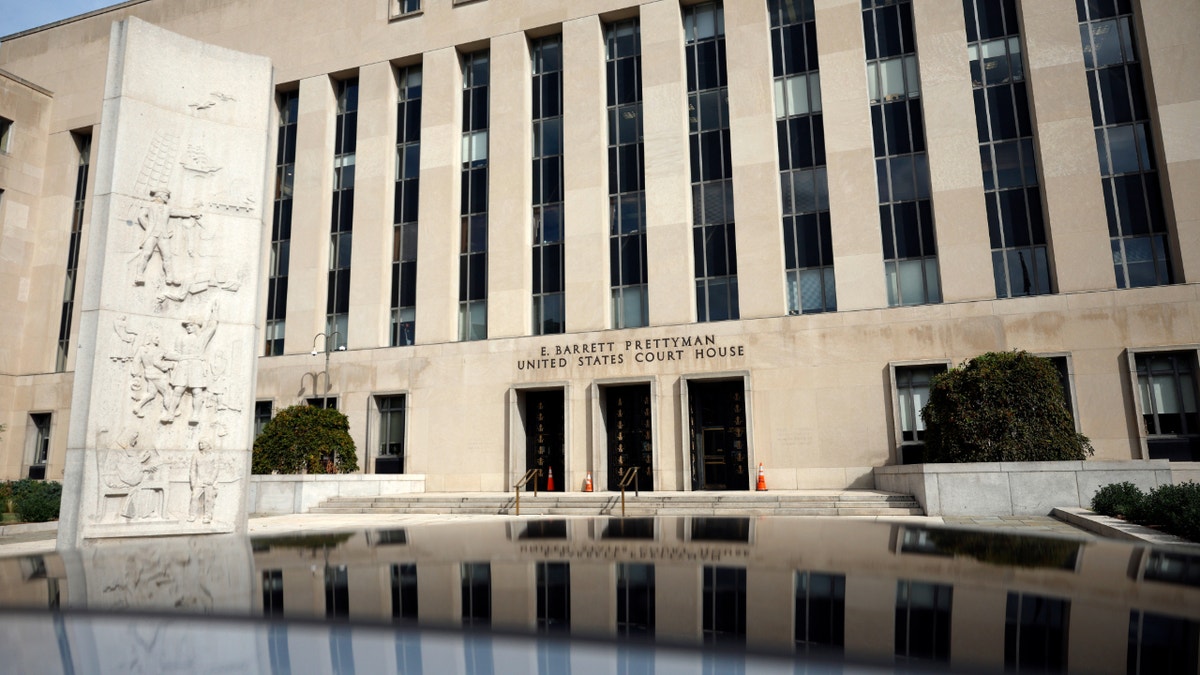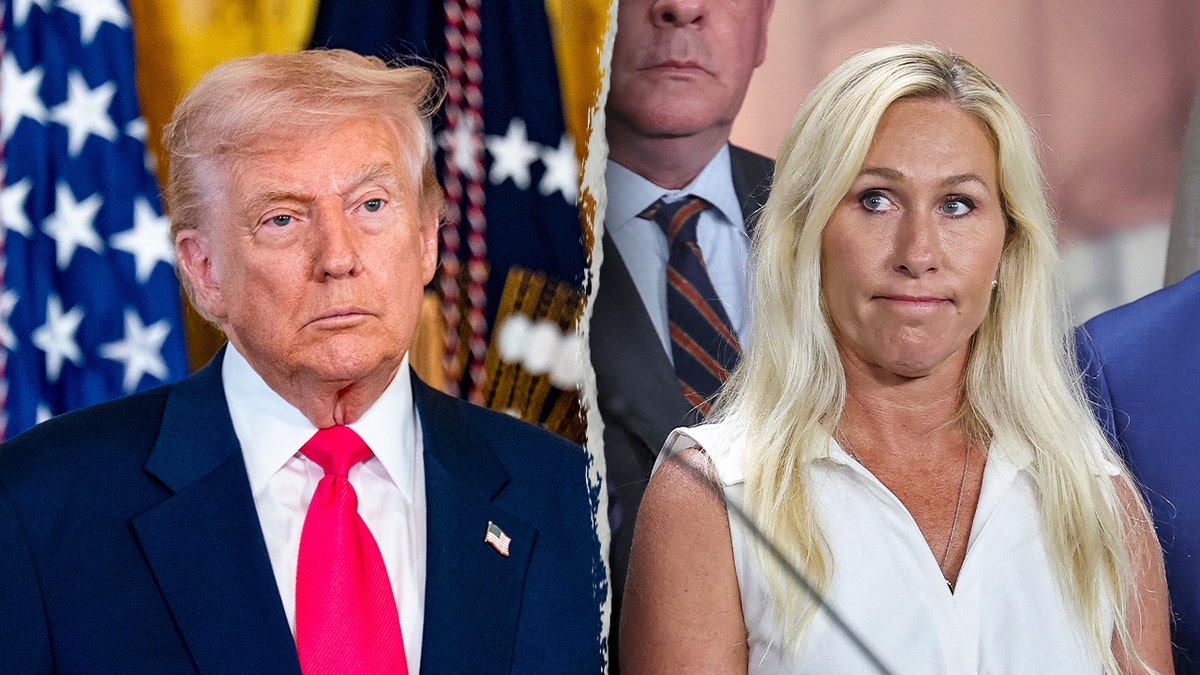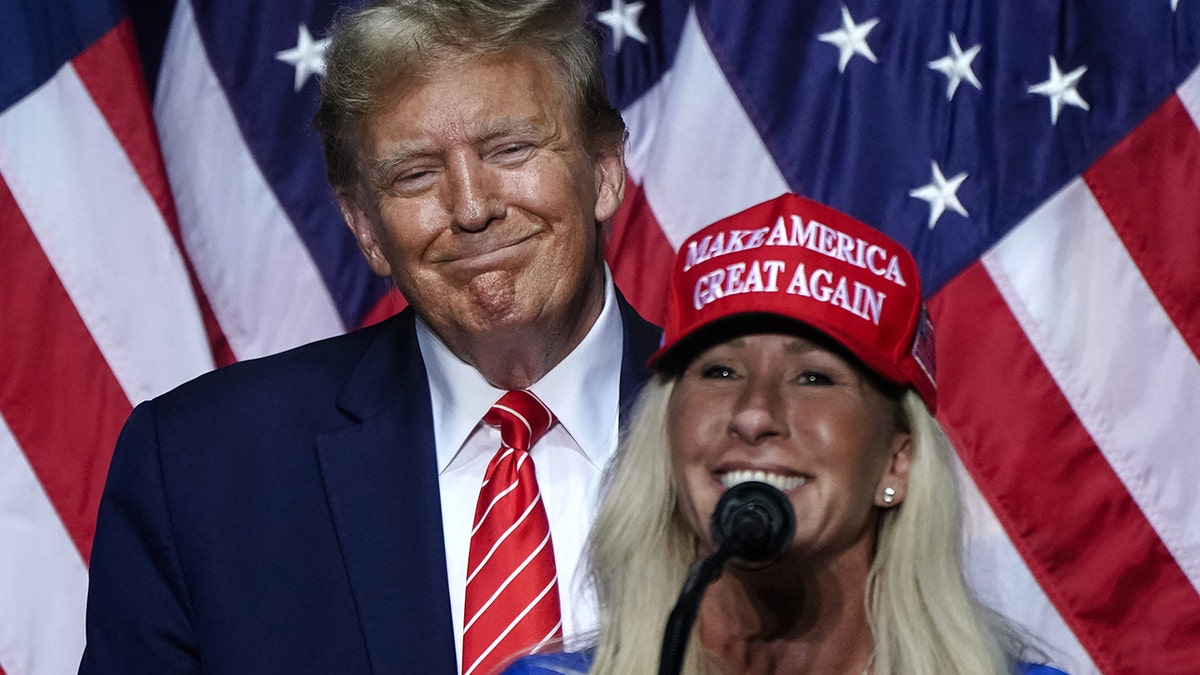INTERNACIONAL
Lawyers for Cook, DOJ trade blows at high-stakes clash over Fed firing

NEWYou can now listen to Fox News articles!
A federal judge in Washington, D.C., on Friday grilled lawyers for the Justice Department and Lisa Cook over President Donald Trump’s historic attempt to fire her from the Federal Reserve.
The landmark case is almost certain to be kicked to the Supreme Court for review. Despite the high-stakes nature of the legal dispute, Friday’s hearing ended after more than two hours without clear resolution.
U.S. District Judge Jia Cobb, a Biden appointee, declined to immediately grant the temporary restraining order sought by Lisa Cook’s attorneys, which would keep her in her role on the Fed’s Board of Governors for now.
Cook’s lawyers included the request for the temporary restraining order in the lawsuit filed in federal court on Thursday, challenging Trump’s attempt to fire her from her position on the independent board due to allegations of mortgage fraud.
APPEALS COURT BLOCKS TRUMP FROM FIRING FEDERAL BOARD MEMBERS, TEES UP SUPREME COURT FIGHT
President Donald Trump speaks with reporters in the Oval Office of the White House Aug. 22, 2025, in Washington, D.C. (Jacquelyn Martin/AP Photo)
Instead, Judge Cobb ordered both parties to submit any supplemental briefs to the court by Tuesday, shortly before she dismissed the lawyers for the long weekend.
Cobb noted the novelty of the case before her, which involves the first attempt by a sitting president to oust a Federal Reserve governor «for cause.»
The fraud allegations were first leveled by Bill Pulte, a Trump appointee to the federal agency that regulates Fannie Mae and Freddie Mac. He accused Cook of claiming two primary residences in two separate states in 2021, with the goal of obtaining more favorable loan conditions.
Trump followed up by posting a letter on Truth Social earlier this week that he had determined «sufficient cause» to fire Cook, a dismissal he said was «effective immediately,» prompting her attorneys to file the emergency lawsuit.
The crux of Friday’s arguments centered on the definition of what «for cause» provisions must entail for removal from the board under the Federal Reserve Act, or FRA, a law designed to shield members from the political whims of the commander in chief or members of Congress.
The arguments also centered on Cook’s claims in her lawsuit that Trump’s attempt to fire her amounts to an illegal effort to remove her from the Fed well before her tenure is slated to end in January 2038 to install his own nominee.
Lawyers for Cook argued that her firing was merely a «pretext» for Trump to secure a majority on the Fed board, a contention that Cobb admitted made her «uncomfortable.»
They also attempted to poke holes in the mortgage fraud allegations, which they said were made on social media and «backfilled.»
The case «obviously raises important questions» about the Federal Reserve Board, Cobb said shortly before adjourning court.
She also noted that she had not yet made a determination about the alleged «irreparable harm,» prompting her to set the Tuesday filing deadline.
TRUMP SAYS HE’S ‘ALWAYS’ READY FOR LEGAL FIGHT AS OUSTED FED GOVERNOR PLANS LAWSUIT

President Donald Trump speaks to Fed Chair Jerome Powell during a tour of the Federal Reserve in Washington, D.C., July 24, 2025. (Daniel Torok/White House)
Cook’s attorneys argued Friday that Trump’s attempt to fire her violates her due process rights under the Fifth Amendment, as well as her statutory right to notice and a hearing under the Federal Reserve Act.
Her lawyer, Abbe Lowell, noted on several occasions that there was no «investigation or charge» from the administration prior to Trump’s abrupt announcement that he would fire Cook.
Lowell also vehemently disputed the Justice Department’s allegations that Cook had an «opportunity» to respond to the mortgage fraud accusations leveled by Bill Pulte, noting that they were made just 30 minutes before Trump called for Cook to be removed.
He told Cobb that it was the latest attempt by the Trump administration to «litigate by tweet.»
A LOOK AT THE UNFOLDING BATTLE BETWEEN TRUMP AND POWELL OVER FED POLICY

Abbe Lowell in 2024 arriving to the J. Caleb Boggs Federal Building in Wilmington, Delaware. Lowell, Hunter Biden’s former lawyer, is now representing Lisa Cook in her court case centered on Trump’s attempt to fire her from her role on the Fed’s Board of Governors. (Anna Moneymaker/Getty Images)
Lawyers for the Trump administration, for their part, argued that the president has broad latitude to determine the «for cause» provision.
Justice Department attorney Yakoov Roth told Cobb that the determination of when to invoke the provision should be left to the president, regardless of whether it is viewed by others as «pretextual.»
«That sounds to me like the epitome of a discretionary determination, and that is when the president’s power is at [its] apex,» Roth said.
DOJ lawyers also noted that Cook, to date, has not disputed any of the allegations in question and argued there is «nothing she has said» about the allegations that would cause her to not be fired.
«What if the stated cause is demonstrably false?» Cobb asked, going on to cite hypothetical concerns that a president could, theoretically, use allegations to stack federal boards with majorities.
As for the issue of «irreparable harm,» Justice Department attorneys argued that it would be more harmful for Cook to remain in office, arguing that the «harm of having someone in office who is wrongfully there … outweighs the harm of someone being wrongfully removed from office.»
TRUMP ASKS SCOTUS TO UPHOLD FREEZE ON BILLIONS IN USAID PAYMENTS

The E. Barrett Prettyman U.S. Courthouse in Washington, D.C. (Kevin Dietsch/Getty Images)
Cook’s attorneys said Friday that in reviewing the lawsuit, the court need not itself establish a definition of what «cause» means under the Federal Reserve Act.
Instead, Lowell suggested, the court should instead work backwards to determine whether the accusations leveled by Pulte were in fact «backfilled» by Trump to form the basis of her removal.
CLICK HERE TO GET THE FOX NEWS APP
«It’s very difficult to come up with an 11-page definition of what it is,» Lowell said Friday of the «cause» definition, adding that it is far easier to come up with a one-page definition of «what it’s not.»
«Whatever it is, it’s not this,» Lowell said.
donald trump,politics,federal courts,supreme court,economic policy
INTERNACIONAL
Trump gives ex-ally Greene new nickname after dropped endorsement, says she betrayed ‘entire Republican Party’

NEWYou can now listen to Fox News articles!
President Donald Trump gave Rep. Marjorie Taylor Greene, R-Ga., a new nickname and accused her of betraying «the entire Republican Party» as a feud between the two escalates.
«Lightweight Congresswoman Marjorie Taylor Brown (Green grass turns brown when it begins to ROT!), betrayed the entire Republican Party when she turned Left, performed poorly on the pathetic View, and became the RINO that we all know she always was. Just another fake politician, no different than Rand Paul Jr. (Thomas Massie), who got caught being a full-fledged Republican In Name Only (RINO)! MAKE AMERICA GREAT AGAIN!!!,» Trump wrote on Truth Social on Saturday.
«Marjorie Taylor Brown» is the second nickname Trump has bestowed upon the congresswoman in the last 24 hours. The initial nickname he gave her was «Wacky Marjorie.»
After his initial post on Saturday morning, the president posted again and gave his former ally yet another nickname, calling her «Marjorie ‘Traitor’ Greene.»
TRUMP DROPS MARJORIE TAYLOR GREENE ENDORSEMENT, CALLS HER A ‘RANTING LUNATIC,’ HINTS AT BACKING PRIMARY RIVAL
Rep. Marjorie Taylor Greene, R-Ga., talks with reporters after a meeting of the House Republican Conference at the Capitol Hill Club on Tuesday, Sept. 9, 2025. (Tom Williams/CQ-Roll Call, Inc via Getty Images)
«Marjorie ‘Traitor’ Green [sic] is a disgrace to our GREAT REPUBLICAN PARTY!,» Trump wrote on Truth Social.
On Saturday, Greene posted a message on X thanking those who reached out amid her feud with the president.
«I never thought that fighting to release the Epstein files, defending women who were victims of rape, and fighting to expose the web of rich powerful elites would have caused this, but here we are. And it truly speaks for itself,» Greene wrote.
«The toxic political industrial complex thrives on ripping us all apart but never delivers anything good for the American people, whom I love,» she added. «I believe in the American people more than I believe in any leader or political party and the American people deserve so much better than how they have been treated by both sides of the aisle.»
She then replied with her personal account and added screenshots of her «Liberty Score» — a grading system used by Conservative Review — and that of Sen. Lindsey Graham, R-S.C., showing that she received an «A» while the senator was given an «F.» She also included a graphic from «AIPAC Tracker» showing the American Israel Public Affairs Committee (AIPAC) had not given her any donations.
«This and the Epstein files is why I’m being attacked by President Trump. It really makes you wonder what is in those files and who and what country is putting so much pressure on him? I forgive him and I will pray for him to return to his original MAGA promises,» she wrote.

President Donald Trump withdrew his endorsement of Rep. Marjorie Taylor Greene, R-Ga., on Friday, Nov. 14, 2025. (Al Drago/Bloomberg via Getty Images; Jonathan Ernst/Reuters)
MARJORIE TAYLOR GREENE SURPRISES ‘THE VIEW’ CO-HOSTS WITH CIVILITY, PRAISE
Trump announced on Friday that he was withdrawing his support and endorsement of Greene, calling her a «ranting lunatic.» He also accused her of «complaining» instead of celebrating what he described as his administration’s «record achievements.» The president, in a lengthy Truth Social post, then vowed «complete and unyielding support» for «the right person» if someone were to challenge Greene in 2026.
The president claimed that Greene was complaining to others that he was not returning her calls. He said that «with 219 congressmen/women, 53 U.S. senators, 24 cabinet members, almost 200 countries, and an otherwise normal life to lead, I can’t take a ranting lunatic’s call every day.»
After the post on Friday, Greene said that «President Trump just attacked me and lied about me. I haven’t called him at all, but I did send these text messages today. Apparently this is what sent him over the edge. The Epstein files.»
In the post on X, Greene included a screenshot of a message she claimed she sent to Trump. The message read, «Check the flight logs of Epstein’s plane. Bill Clinton is on there like 26 times! Hillary too!! For many of us releasing the Epstein files has always been for the women who were victims of Jeffery Epstein, but also because we believed that Democrat bad guys like the Clintons were entangled and involved with him. Epstein was the spider that wove the web of the deep state. Lean into it.»
The congresswoman accused Trump of «coming after me hard to make an example and scare all the other Republicans before next weeks [sic] vote to release the Epstein files.» She remarked that it was «astonishing» that Trump was «fighting» to stop the files from being released to the public.
THE REVOLT OF MARJORIE TAYLOR GREENE, NOW DONALD TRUMP’S FIERCEST CRITIC
Greene declared where her loyalty will always lie, writing, «I have supported President Trump with too much of my precious time, too much of my own money, and fought harder for him even when almost all other Republicans turned their back and denounced him.»
«But I don’t worship or serve Donald Trump. I worship God, Jesus is my Savior, and I serve my district GA14 and the American people,» she wrote.

Rep. Marjorie Taylor Greene, R-Ga., speaks alongside then-2024 presidential hopeful Donald Trump at a campaign event in Rome, Georgia, on March 9, 2024. (Elijah Nouvelage/AFP via Getty Images)
CLICK HERE TO DOWNLOAD THE FOX NEWS APP
Greene had been a strong supporter of Trump since she entered Congress in 2021. However, she has become a vocal critic of the president, particularly when it comes to U.S.-Israel relations and the Epstein files.
On Nov. 4, Greene joined the co-hosts of «The View,» who are famously critical of Trump, and discussed a wide range of topics. When co-host Sunny Hostin remarked that it seemed like Greene had moved to the left — something Trump later echoed — Greene pushed back, insisting that «there’s lies that come in both sides.»
donald trump,politics,washington dc,republicans
INTERNACIONAL
Un nene perdió dos dedos tras un brutal ataque en una escuela de Portugal y su mamá denunció un ataque racista

Un hecho estremecedor sacudió a la localidad de Cinfães, en el distrito de Viseu, Portugal: José Lucas, un nene brasileño de 9 años, perdió dos dedos luego de un violento ataque dentro de la Escuela Básica de Fonte Coberta. Según denunció su madre, Nívia, el chico ya había sido víctima de otras agresiones en el colegio, pero esta vez la situación escaló a un nivel dramático.
El episodio ocurrió apenas una hora y media después de que el chico llegara a la escuela, ubicada a unos 130 kilómetros de Oporto. De acuerdo a la madre, dos compañeros siguieron a José al baño y le cerraron la puerta sobre los dedos, presionando hasta amputárselos. El nene, desesperado por el dolor, intentó abrir la puerta pero no pudo y tuvo que arrastrarse para pedir ayuda.
Leé también: Tragedia en Grecia: un joven quedó en estado crítico tras tragarse una hamburguesa entera por una broma
“¿Por qué vine más temprano a la escuela?”: el desgarrador testimonio de la madre
Nívia contó que la primera empleada que encontró a su hijo se descompuso por el impacto. La segunda, en cambio, le dijo al nene: “¿Por qué vine más temprano a la escuela?”. Las trabajadoras lograron frenar la hemorragia, pusieron hielo y llamaron a la madre.
Mientras tanto, la docente de la clase, Sara Costa, se comunicó con Nívia y le dijo que José “estaba jugando” y que “se machucó el dedo con la puerta”, minimizando la gravedad del hecho.
José Lucas perdió dos dedos en una agresión en la escuela. (Foto: gentileza g1).
Sin embargo, la madre escuchó de fondo que alguien pedía una ambulancia y salió corriendo hacia la escuela, que queda a menos de cinco minutos de su casa. Nadie le avisó que su hijo había perdido dos dedos.
Al llegar, la condujeron al fondo del edificio y encontró a su hijo gritando de dolor, con la mano vendada y una tela en la boca para morder por el dolor. “Mi hijo no le pega a nadie, es una buena persona. ¿Voy a enseñarle a mi hijo a pegar?”, les reclamó a los empleados del colegio.
El rescate y la cirugía: “No sé si eran dos o tres dedos”
Los bomberos tardaron entre 30 y 40 minutos en llegar. La escuela guardó uno de los fragmentos amputados y lo entregó a los paramédicos. Durante el traslado, un bombero le pidió a Nívia que llevara una bolsa con partes de los dedos de su hijo: “No sé si eran dos o tres, porque no quisieron revisar”, le dijo el rescatista.
En el hospital, José Lucas fue operado durante tres horas. Los médicos informaron que no era posible reimplantar los dedos y usaron parte de uno para cubrir la zona expuesta. El nene perdió la primera falange del dedo mayor y del índice, justo donde está la uña. “El dedo mayor quedará sin uña y el índice con solo la mitad”, explicó la madre.
“Esa escuela no es para tu hijo”: la advertencia de la asistente social
Tras la cirugía, el hospital dio aviso a una asistente social, que notificó a la Comisión de Protección de Niños y Jóvenes de Portugal. El organismo abrió una investigación y la profesional aconsejó a la madre que sacara a su hijo de la escuela: “Siguen diciendo que fue una travesura. Si podés cambiar de escuela y de ciudad, hacelo”, le recomendó.
Leé también: Espeluznante video: asesinó a una mujer y la llevó a caballo hasta un descampado
Nívia fue a la policía local, pero le dijeron que se trataba de un accidente, como había informado la escuela, y que debía aceptar esa versión.
La repercusión del caso recién comenzó cuando la madre publicó lo ocurrido en redes sociales. “Vine a Portugal buscando una vida mejor. Viví tres años en Oporto y después me mudé a una zona más barata. Ahora tengo que cambiar todo de nuevo. Tengo miedo”, confesó Nívia, que nació en Belém, Brasil, y vive en Portugal desde hace siete años.
Un historial de violencia y discriminación
La madre denunció que su hijo ya había sufrido agresiones previas en la escuela.
En una ocasión, “lo arrinconaron contra la pared y le dejaron marcas moradas” en el cuello, contó. También mencionó tirones de pelo, patadas y hasta intentos de ahorcarlo. Según Nívia, la escuela nunca tomó medidas y, tras la amputación, volvió a tratar el hecho como una simple “broma”. José Lucas ya había sido víctima de varias agresiones. (Foto: gentileza g1).
Nívia aseguró que su hijo fue agredido por ser brasileño, negro, tener sobrepeso, además de ser nuevo en la escuela. Este era el primer año de José Lucas en la institución.
“¿Por qué me hicieron esto?”: el drama psicológico tras la agresión
Nívia contó que José Lucas sufre crisis de llanto cada vez que recuerda la violencia. “Durante el día está bien, pero a la noche pregunta por qué le hicieron eso y quién va a pagar. Yo trato de contenerlo, pero todavía estoy procesando todo”, expresó la madre, que ahora vive con miedo y decidió mudarse.
Portugal, Bullying
INTERNACIONAL
Así se hace el perfume indio que huele a tierra mojada y vale más de USD 2.000 el litro

En Kannauj, una ciudad al norte de la India ubicada a unos 400 kilómetros de Nueva Delhi, familias de perfumistas preservan una tradición que permite capturar el olor de la tierra mojada tras la primera lluvia del monzón (cambio estacional en los patrones de vientos que trae consigo temporadas de precipitaciones intensas).
Este perfume, conocido como mitti attar, se comercializa a más de USD 2.000 el litro y representa uno de los mayores tesoros olfativos del país.
Desde hace más de tres mil años, Kannauj funciona como epicentro de la industria perfumera local, atrae visitantes internacionales y mantiene técnicas ancestrales de producción intactas hasta la actualidad.
El aroma de la lluvia, llamado petricor en lenguaje científico, simboliza la esperanza y el renacimiento para millones de personas en la India, donde la llegada del monzón marca el fin del periodo seco.

De acuerdo al sitio web especializado Travesías Digital, los perfumistas de Kannauj dedicaron generaciones a perfeccionar la captura y conservación de esa esencia, elaborando el mitti attar a partir de materiales naturales y un método de destilación único en el mundo.
Según detalló Atlas Obscura, el proceso y el resultado entusiasman a clientes de Francia, Estados Unidos y otros países, quienes valoran la autenticidad y profundidad aromática que solo este perfume ofrece.
La demanda de mitti attar se mantiene en ascenso, impulsada por el regreso global a los aceites y fragancias naturales en la perfumería de autor. Kannauj se identifica como la “capital del perfume de la India” y compite con otras regiones históricas, como Grasse, en Francia, gracias a su legado técnico y cultural.

El proceso para obtener mitti attar comienza tras las primeras lluvias monzónicas. Los perfumistas recogen ladrillos y discos de barro local, que el sol y la lluvia han moldeado. Estos materiales se cuecen y se seleccionan minuciosamente según su capacidad para retener el aroma.
Luego, los artesanos colocan la arcilla en grandes ollas de cobre (deg), junto con agua. El recipiente se sella mediante una mezcla de barro y se somete a calor controlado con fuego de leña y estiércol seco.
Durante al menos siete horas, la olla se calienta y el vapor producido viaja por un tubo de bambú hacia un recipiente especial (bhapka) que contiene aceite puro de sándalo. El vapor aromático se condensa y el aceite absorbe, lentamente, la esencia de la tierra mojada.

Según precisó Atlas Obscura, el destilador repite el proceso durante varios días, retirando y reemplazando tierra y agua, hasta lograr que el aceite sature su fragancia.
Según Rajat Mehrotra, responsable de Meena Perfumery en Kannauj, solo esta ciudad domina el arte de preservar el olor original de la tierra tras la lluvia en un producto embotellado.
El perfume, al ser un aceite, se almacena al final en frascos de cuero o camello, donde madura y gana detalles aromáticos durante años. Un litro de mitti attar cuesta más de USD 2.000 debido al trabajo intensivo, la escasez de materia prima y la exclusividad del método.
El origen exacto del mitti attar se remonta, probablemente, a la civilización del Valle del Indo, que desarrolló técnicas de destilación de aceites y aguas florales hace más de tres milenios.

Según la investigadora Giti Datt, especialista de la Australian National University, la práctica sobrevivió invasiones, cambios religiosos y colonización británica. El Mahabharata, uno de los textos más antiguos de la India, ya hacía referencia al uso de perfumes en la vida diaria de la realeza y en rituales sagrados.
Con la llegada del islam, la tradición se enriqueció y surgió la cultura indefinida del attar, una perfumería de aceites puros extractados de flores, maderas y resinas.
Kannauj ostenta hoy el reconocimiento internacional de capital india del perfume y recibe visitas de perfumistas de países como Francia, que buscan aprender el método artesanal o utilizan el attar como base para combinaciones. El mitti attar se asocia a recuerdos, identidad y espiritualidad, y se emplea en ceremonias hinduistas y en la vida cotidiana.
El método no se replicó con éxito fuera de la ciudad, ya que la combinación única del barro local, el clima monzónico y el saber transmitido entre generaciones forman la clave del aroma.
perfume con olor a tierra mojada

 POLITICA2 días ago
POLITICA2 días agoUna auditoría en el PAMI detectó fraudes y falsificaciones en órdenes médicas

 CHIMENTOS2 días ago
CHIMENTOS2 días ago¡Muy doloroso! Mauro Icardi recibió la peor puñalada de los últimos años de quien menos la esperaba: «Tal vez…»

 POLITICA2 días ago
POLITICA2 días agoCausa Cuadernos: uno por uno, quiénes son los 25 arrepentidos que podrían ser determinantes

























